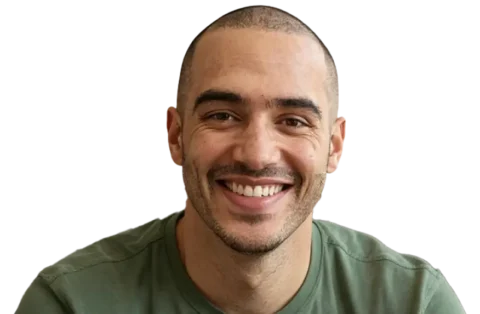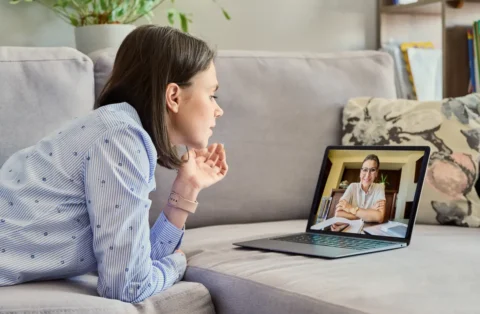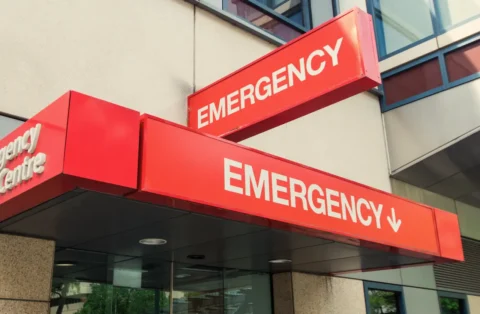What you’ll learn
We’ll explore the groundbreaking recent study showing how GLP-1 medications like Ozempic® and Wegovy® might help treat addiction, particularly opioid use disorder. You’ll learn about the latest clinical trial results and data, understand the science behind why these drugs show promise for treating addiction, and discover how this fits into a growing list of unexpected benefits researchers keep finding with GLP-1s.
Addiction affects millions of Americans, and finding effective treatments remains one of healthcare’s biggest challenges. In the United States, one person dies from a drug overdose every five minutes. For people struggling with opioid use disorder and their families, new treatment options can’t come soon enough.
When researchers at Penn State College of Medicine started studying GLP-1 medications for addiction, they weren’t sure what they’d find.
These are the medications you know as Ozempic and Wegovy. These medications have transformed weight loss treatment. What researchers discovered could change how we think about substance use disorders and addiction treatment entirely.
So what if the same medications helping people lose weight could also help break the cycle of addiction?
It’s early research, but the promising results are enough that researchers are calling it a potential breakthrough in addiction medicine.
At QuickMD, we’ve seen firsthand how GLP-1 medications have transformed weight loss treatment for our patients. Now, emerging science suggests these medications might work on addiction in ways we’re just beginning to understand. Either way, we’re eager to see what the future holds.
The connection isn’t a coincidence. It’s rooted in how addiction and appetite share similar pathways in the brain. But we want to make something clear: this research isn’t about replacing proven addiction treatments.
It’s more about potentially adding a new tool to help people when traditional approaches aren’t enough. And for the millions of Americans struggling with alcohol use disorder and opioid addiction, any new avenue of hope matters.
How GLP-1 medications could help with addiction
To understand why weight loss medications might help with addiction and other health conditions, we need to look at what happens in the brain when someone craves something, whether it’s food or drugs.
Both addiction and appetite involve the brain’s reward system.
When you’re hungry, your brain releases signals that drive you to seek food. When someone has an addiction, their brain sends similar urgent signals to seek their substance of choice.
GLP-1 medications work by acting like hormones that signal fullness and satisfaction after eating. But researchers discovered something interesting: these same pathways might influence other types of cravings too.
Dr. Patricia “Sue” Grigson, a researcher at Penn State College of Medicine, explains it this way:
[“For decades, people have thought about addiction as hijacking the brain’s reward pathway. If it’s a physiological need, we wondered if a drug that elicits satiety or fullness could be helpful.”] – Dr. Patricia “Sue” Grigson
It’s not that addiction is the same as hunger. But the brain circuits involved in both are more related than we previously understood.
GLP-1 addiction research: what clinical trials show
The most compelling evidence comes from a small but carefully designed clinical trial at Penn State College of Medicine.
Researchers worked with 20 people in residential treatment for opioid use disorder, giving half the group liraglutide (a GLP-1 medication) and half a placebo.
The results were striking. People taking the GLP-1 drug experienced a 40% reduction in opioid craving compared to those on placebo. Additionally, a study involving over 1 million patients found that those taking GLP-1 receptor agonists experienced a lower rate of opioid overdose and alcohol intoxication.
That reduction was equivalent to what researchers typically see after two weeks of intensive residential treatment. But the GLP-1 group achieved it through medication alone.
Dr. Scott Bunce, who co-led the study, found that the medication helped people slow down their impulses.
[“Patients have told me that it slows down their need for immediate gratification of their craving, allowing them to make better, and healthier, decisions,”] – Dr. Scott Bunce
The study used smartphone apps to track cravings in real-time throughout the day. While people on placebo typically experienced increasing cravings in the afternoon and evening, those taking liraglutide maintained steady, lower craving levels.
How GLP-1 medications might work for substance use
GLP-1 medications influence several brain systems that overlap with addiction:
- Reward pathways: These medications may reduce the intense reward signals that drive addictive behaviors, similar to how they reduce food cravings.
- Impulse control: GLP-1s might help people pause between feeling a craving and acting on it, creating room for better decision-making.
- Stress response: The medications appear to help maintain lower craving levels even when people report high stress, a common trigger for relapse.
It’s important to understand that researchers aren’t suggesting GLP-1 medications replace proven addiction treatments like buprenorphine or methadone. Instead, they might work alongside these existing medications to provide additional support.
GLP-1 benefits beyond weight loss and addiction
The potential for addiction treatment is just the latest in a growing list of unexpected benefits researchers keep discovering with GLP-1 medications. Initial studies have shown promising results for GLP-1s in treating food addiction, opioid, alcohol, and nicotine addiction, and other substance use disorders.
- Heart health: These medications have the potential to significantly reduce the risk of heart attack and stroke, even in people without diabetes.
- Kidney protection: GLP-1s help protect kidney function, especially important for people with diabetes or high blood pressure.
- Brain health: Early research suggests potential benefits for cognitive function and possibly neurodegenerative diseases.
- Sleep apnea: Clinical trials are exploring whether weight loss from GLP-1s can improve sleep breathing disorders.
This pattern, finding new uses for medications originally designed for one condition, isn’t unusual in medicine. But what started as diabetes medications has become some of the most studied medications in medicine today.
Want to learn more about GLP-1 medications? Check out our Learning Center for info like how GLP-1s work for weight loss, GLP-1 side effects and what to expect, and choosing the right weight loss medication for you.
What does this mean for people struggling with addictive disorders?
If you or someone you love is dealing with addiction, this research offers genuine hope. But it’s crucial to understand where we are in the process.
The Penn State study was small, involving only 20 participants, and was conducted in a controlled residential setting. Researchers are now planning a much larger trial with 200 participants across multiple sites to confirm these early findings.
The researchers emphasize that GLP-1s wouldn’t replace medications like buprenorphine or methadone that are proven to help with opioid addiction. Instead, they might work together as part of a comprehensive treatment plan.
For context, medications like buprenorphine-naloxone (known as Suboxone) are currently the best options for opioid use disorder treatment.
Suboxone helps reduce cravings and withdrawal symptoms. The exciting possibility is that GLP-1s might enhance these already effective treatments.
If you’ve tried everything and still feel stuck, that doesn’t mean you’re doing something wrong. Sometimes our bodies need additional support to break patterns that feel impossible to change on willpower alone.
Future of GLP-1 receptor agonists, research, and FDA approval
The next phase of research will be crucial. Starting this year, researchers will begin a larger clinical trial using semaglutide (the medication in Ozempic and Wegovy) with 200 participants across three major medical centers.
This larger study will help answer important questions:
- Do the benefits hold up in a bigger, more diverse group of people?
- How do GLP-1s work alongside other addiction medications?
- What are the optimal doses and treatment durations?
- Are there side effects specific to people with addiction?
If the results remain positive, researchers hope to work with the FDA to approve GLP-1 medications for addiction treatment. The fact that these drugs are already approved for other uses could potentially help that process.
The bigger picture: hope in addiction treatment
Addiction is incredibly complex, involving genetics, environment, trauma, and brain chemistry. No single medication will be a cure-all. But having more tools available means more people might find a path to recovery that works for them.
The GLP-1 research adds to existing evidence that addiction responds to medical treatment, just like other chronic conditions. While we wait for larger studies, effective treatments like Suboxone are already helping people recover. For the families and individuals affected by the opioid crisis, research like this represents hope.
Getting help for addiction with QuickMD
If you’re struggling with addiction, please know that effective treatments are available now. Medication-Assisted Treatment for opioid use disorder is a clinically proven approach that integrates FDA-approved medications like Suboxone (buprenorphine-naloxone) with counseling and behavioral therapies to treat opioid dependence.
We understand that seeking help for addiction can feel overwhelming. That’s why we offer confidential, judgment-free consultations with licensed providers who specialize in addiction medicine.
Our providers can prescribe proven treatments, which help reduce cravings and withdrawal symptoms while supporting your long-term recovery. Whether you’re seeking addiction treatment or weight management support, our providers are here to create a personalized plan that fits your needs.
While GLP-1 medications for addiction are still being researched, proven treatments are available today. You don’t have to wait for tomorrow’s breakthroughs to start your recovery.
Frequently asked questions about GLP-1 medications and addiction
Who is conducting research on this topic?
Multiple academic and clinical research institutions around the world are investigating the potential of GLP-1 drugs for addiction. Recent studies have been published by major publishers and can be found on the National Library of Medicine website, among others.
How do GLP-1 medications compare to proven addiction treatments like buprenorphine?
GLP-1 medications wouldn’t replace proven treatments like buprenorphine or methadone. Instead, researchers are studying whether they could work alongside these medications to provide additional support. The early research suggests GLP-1s might help reduce cravings while people continue their established addiction treatment.
Are there risks to using GLP-1 medications if I have an addiction?
The most common side effects of GLP-1 medications include nausea, vomiting, and digestive issues, which typically improve over time. In the addiction research, safety was a primary concern, which is why the first study was conducted in a residential treatment facility with medical supervision. More research is needed to understand any interactions or effects specific to people with addiction.




